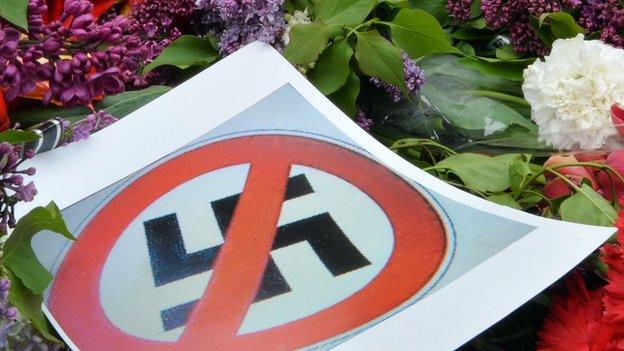Putin's Russian image change: Action man to Mr Ordinary
- Published
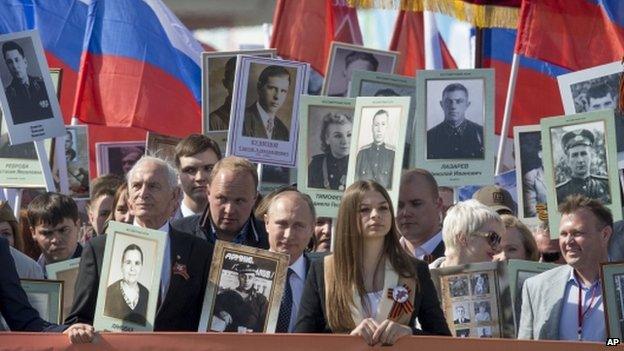
President Putin joined a march on Red Square, holding a picture of his father in uniform
As viewers watched Russian state TV coverage of Victory Day on 9 May, their eyes will have been drawn to one face in particular among the crowds carrying photographs of family members who took part in the struggle against Nazi Germany between 1941 and 1945.
Among the massed ranks, a portrait of his late father held out in front of him, was President Vladimir Putin.
This surprise appearance amid crowds in Moscow honouring ordinary people who served in World War Two seems to be part of a change of image for the Russian president - portraying him more as a down-to-Earth man of the people, rather than the all-action hero TV viewers have become used to seeing.
For over 30 seconds, TV commentators made no reference to his surprise appearance. But then anchor Vladimir Solovyev supplied the meaning of what was undoubtedly a carefully choreographed media event.
"There were no loud announcements and no commotion. Why?" said Mr Solovyev. "Because this is an amazing event at which politics moves into the background. It is a day when all are equal."

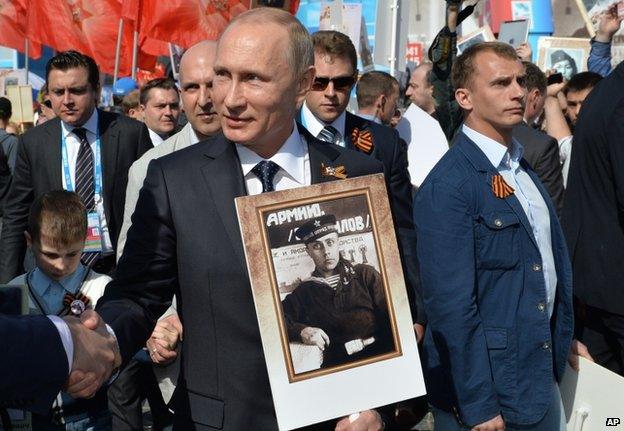

Not everything went completely smoothly.
As the president paused for a short interview surrounded by his security entourage, an old man button-holed him to ask about the benefits he was due as someone affected by the 1986 nuclear disaster in Chernobyl.
'Masterstroke'
The cameras quickly moved away. But Solovyev continued in the same lyrical vein. "Victory Day - everyone is equal. People just come up to the president of the Russian Federation and talk to him."
The message of the people's president was reinforced in other parts of the media. "Putin acted like an ordinary man," proclaimed a headline on the popular news website Gazeta.ru, external.
Commentator Aleksey Malashenko described it as a political masterstroke.
"I would not be surprised if at that moment the president's rating had reached 100%. Yes, it was populism, but sincere populism," he blogged on the Ekho Moskvy radio station website., external
Prezident
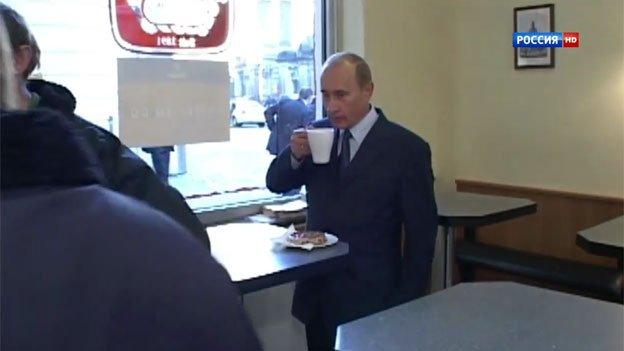
The Russian president was shown drinking coffee with locals in a Dresden cafe in 2006
Putin as man of the people was also one of the key themes of Prezident, a 150-minute film recently shown on official channel Rossiya 1, external to mark the 15th anniversary of the beginning of his rule in 2000.
The film dwelt on the Russian leader's humble origins and his attachment to his late parents.
"He comes from a working family in the suburbs, just like millions of others, millions of his compatriots, same as me, same as you," popular singer Nikolay Rastorguyev said over footage of Putin discussing people's problems in the street.
In the film, President Putin himself stressed that he was not from an "elite background".
"This connection with the people and sense of closeness to them, to ordinary people, are hugely important and a great help to me in my work," he said.
Prezident also featured an episode from 2006 in which Putin visited a coffee shop in Dresden and stood in the corner with his coffee and cake, apparently unnoticed by other customers.
The sequence was shown without commentary as if its only purpose was to reinforce the idea of Putin as the "ordinary man".
In March, Russian TV produced a lavish film on the annexation of Crimea
This portrayal of Putin is in marked contrast to the image of the derring-do hero of the TV stunts for which he has become famous - the bare-chested hunting expeditions, the dive for Greek wine vats in the Black Sea and saving journalists by shooting a Siberian tiger with a tranquilizer, to name but a few.
But it has been some time since Russian TV viewers were treated to Putin in full-blown action-man mode and is a far cry from the image given by a film aired three years ago to mark his 60th birthday.
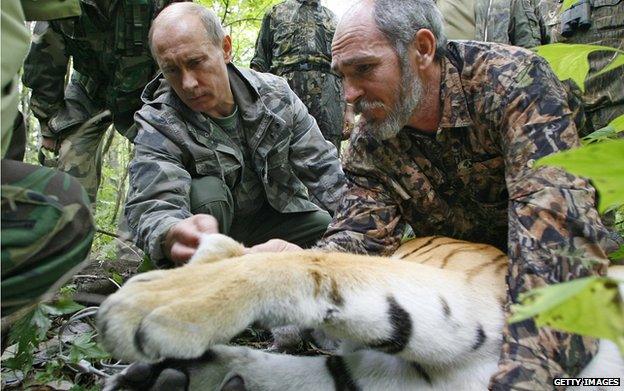
Gone are the outdoor stunts with wild animals
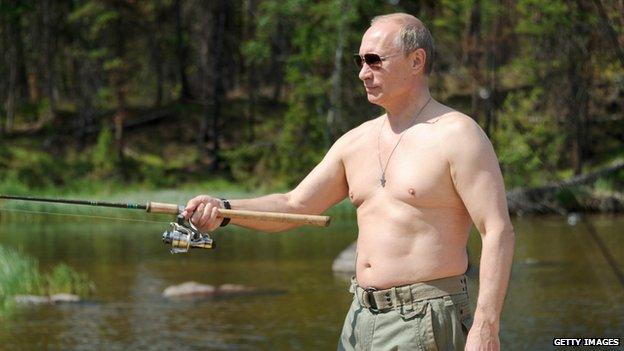
Russian media previously focused on the time he spent working out
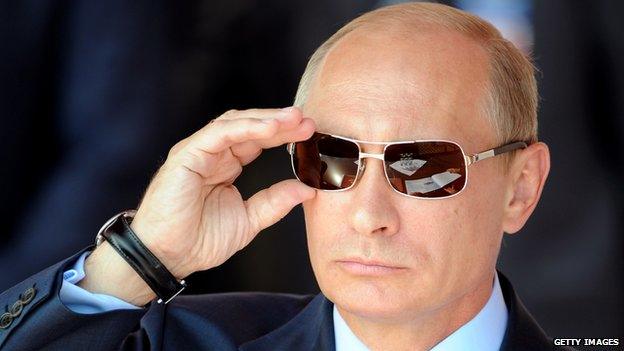
Gone, too, is the action man tone of a few years ago
'Lost touch with reality'
That NTV film showed the president , externalworking late at night, alone in his office, breakfasting on health foods and swimming and exercising in his private gym, watched over by his beloved black labrador Koni.
Media academic Anna Kachkayeva believes, external it portrayed a person who "for a long time has been living in the special dimension of power and has, of course, lost touch with reality".
The wish to show President Putin as an "ordinary man" may be related to the political imperatives of Russia's current economic difficulties. But there may also be a more personal element.
At the end of "Prezident", Vladimir Solovyev asks Mr Putin what he has had to give up as leader of his country.
The president sighs deeply, frowns and answers: "A normal, everyday life."
One journalist, Oleg Kashin, suggested the film may have been less about propaganda than psychotherapy.
BBC Monitoring, external reports and analyses news from TV, radio, web and print media around the world. You can follow BBC Monitoring on Twitter , externaland Facebook, external.
- Published12 May 2015
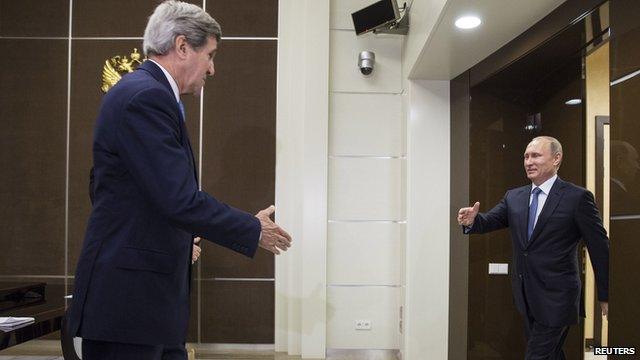
- Published9 May 2015
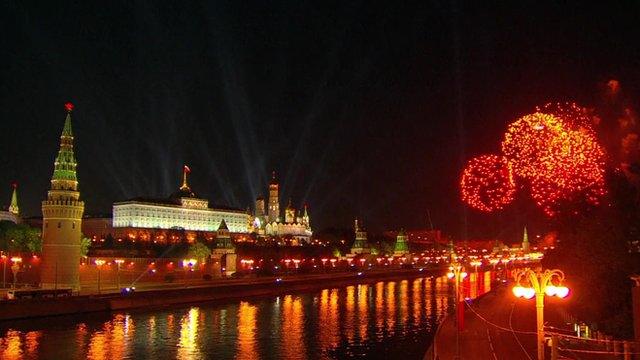
- Published9 May 2015
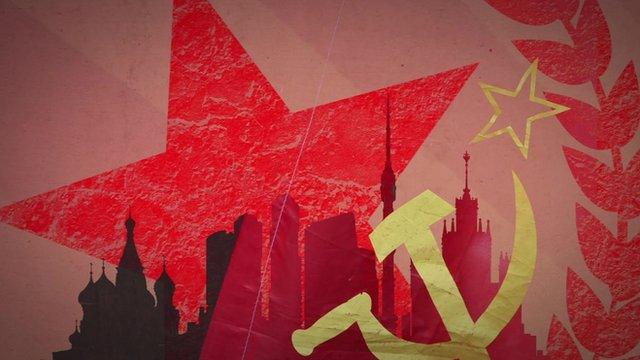
- Published5 May 2015
